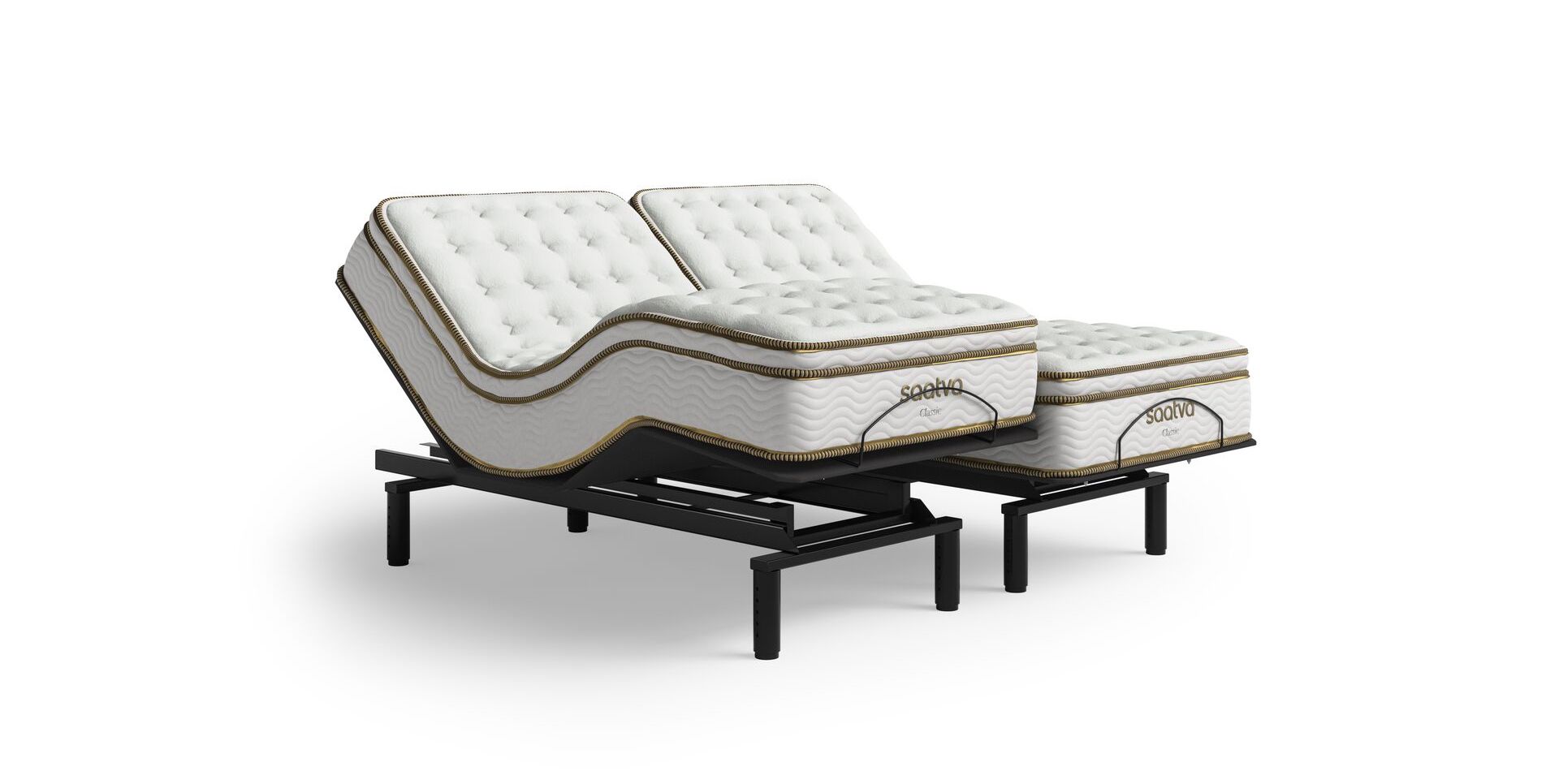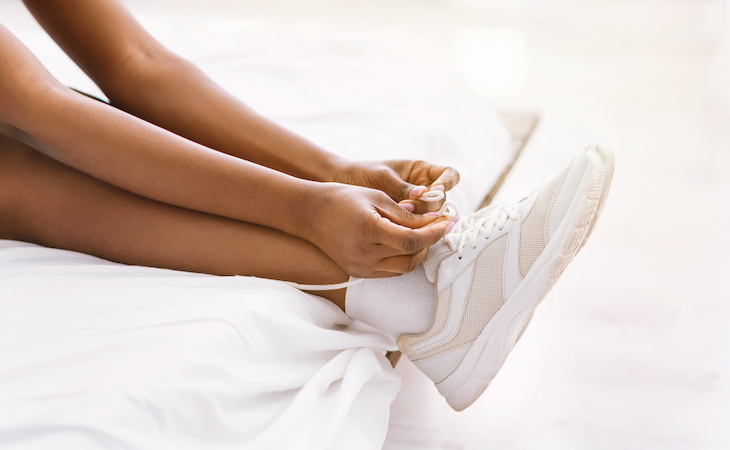You may have seen the recent social media posts from elite athletes sleeping on cardboard beds as they get ready for the biggest professional challenge of their careers.
Apparently, the beds these top athletes are currently sleeping on ahead of this summer’s competition are made of sustainable cardboard that will be recycled afterward. The reviews on comfort, however, are pretty mixed. Some athletes say the beds are too hard to sleep soundly on, while others say the beds are even causing them to experience back pain.
We’ve previously reported on how sleep is crucial for athletes—and it turns out the right mattress can go a long way toward supporting performance and recovery.
Whether you’re a professional athlete, daily workout enthusiast, or just a weekend warrior, you want to make sure your muscles get the rest they require at the end of the day. Ahead, we share how to choose the best mattress for athletes.
The importance of finding the best mattress for athletes
You don’t have to be a professional athlete to benefit from the same approach to sleep that the pros take. Still, every athlete (whether you’re a pro or not) knows that the pathway to peak performance is as much about recovery as it is preparation.
Sleep plays a leading role in recovery because it replenishes energy, revitalizes the nervous system, and releases critical hormones that aid in mood and muscle development.
“Simple drills and exercise become impossible without proper amounts of sleep,” Jamal Liggin, a professional trainer of many top football players, previously told Saatva. College coaches have embraced that philosophy too, monitoring players’ sleep and even tucking them in at night.
Much has been made about professional athletes’ unique and regimented sleeping habits. Michael Phelps, to cite just one example, famously slept in an altitude chamber prior to competing in London in 2012 so he could get acclimated for high-altitude competition.
Most of us aren’t going to these (dare we say) heights when it comes to our sleep. But there are simple ways non-professionals can improve athletic performance, starting with the right sleep surface.
The best mattresses for athletes: 5 features to look for in a mattress
A body that’s in pain, or one that can’t get comfortable, isn’t going to get restorative rest. Finding the best mattress type for athletes comes down to a variety of factors.
Here are the top five qualities athletes look for in a mattress:
1. Comfort level
The key to pain-free and regenerative rest is a good mattress that maintains your spine in proper alignment. That means taking your sleeping position into account when choosing a comfort level.
If you’re a side sleeper, then a slightly softer mattress will help take pressure off hips and shoulders and keep numbness or tingling at bay. If you sleep on your stomach, then a firmer mattress will guard against waking up with back pain.
Back sleepers have more flexibility in mattress choices (this is actually the healthiest position for your body), but generally, a slightly firmer mattress is ideal for keeping your spine in a neutral position overnight.
2. Lumbar support
Any sort of pain can seriously throw you off your fitness game, so protecting your back while you sleep is a must for professional and amateur athletes alike.
The best mattresses for athletes come with added lumbar support, in the form of reinforced foams or other zoned support in the center of the mattress, where most of the body’s weight is typically concentrated.
That keeps hips and shoulders from sinking too low and preserves the natural curvature of the spine.
Sleeping on a mattress without adequate lumbar support night after night could cause lower back pain and can even lead to early-onset arthritis.
3. Anti-sagging
The best bed for athletes should have anti-sagging features, so if yours is dipping in, it may be time for an upgrade. Mattresses that sag don’t give your spine the support it needs. This causes fitful sleep, which makes for sub-optimal performance, on and off the field.
If an innerspring mattress is your bed of choice, then look for one that features a solid base of support coils along with foam-encased edge support, as both of these will help prevent sagging.
In a memory foam mattress, the denser the foam, the less likely the mattress is to sag.
4. Cooling features
Working out gets you all hot and sweaty, so pick a mattress that you can be sure will sleep cool. Certain mattress materials (like foam) trap body heat, while others (like coils) are better at promoting air circulation.
A hybrid mattress—one that combines innerspring coils with foam—might be a good option because they’re strategically layered to promote airflow.
Latex mattresses sleep naturally cool, so they’re another safe bet if sleeping hot is an issue that concerns you.
Many memory foam mattresses these days incorporate cooling features, such as gels and heat-dissipating graphite layers. (Learn about the benefits of eco-friendly memory foam.)
5. Adjustability
After a long session at the gym, we bet that all you want to do is stretch out your muscles and relax. Enter adjustable base beds for athletes: Elevating your legs post-workout will help aid in muscle recovery while you sleep, so you don’t have to worry about waking up with annoying aches and pains.
FAQs
What mattress do most athletes use?
Athletes typically use mattresses that feature added lumbar support to help keep their spine in a neutral position while they sleep. As for mattress type, beds that sleep cool (such as innerspring mattresses, latex mattresses, or gel-infused memory foam mattresses) can help athletes stay comfortable overnight.
What type of mattress is best for muscle recovery?
The best type of mattress for muscle recovery is one that maintains your spine in proper alignment while you sleep. Look for a mattress with added lumbar support in the center third, where most of your body weight lies, to help protect your back while you sleep. Elevating your legs in bed with an

Our deluxe adjustable base with even more customized comfort options
can also aid in muscle recovery.
Get the best mattress for athletes at Saatva
Saatva offers a wide range of mattresses suitable for athletes, including

The first luxury hybrid innerspring for bigger bodies
,

Our dual-sided organic natural latex mattress for buoyant, pressure-relieving comfort
, and

The most luxurious memory foam with adaptive cooling & body-hugging support
.
All of our mattresses come with a 365-night home trial and white glove delivery. Take our mattress quiz to find your perfect match.









